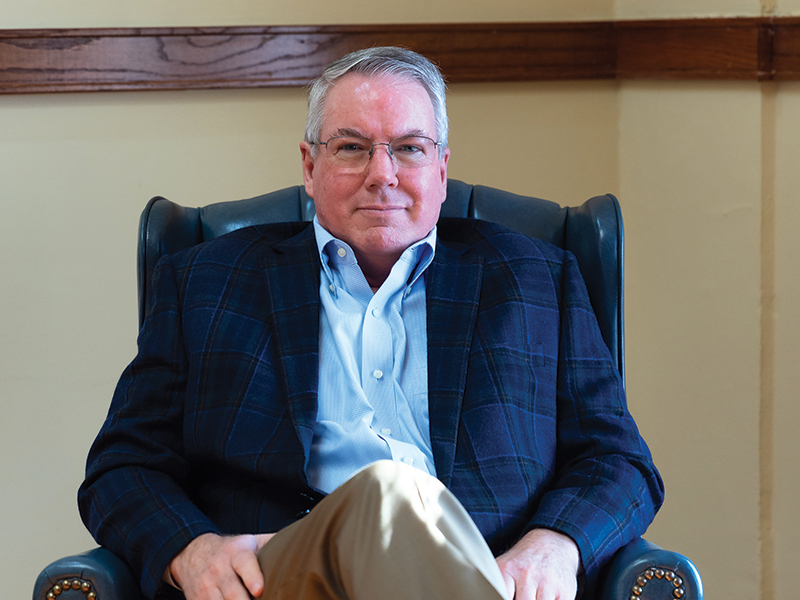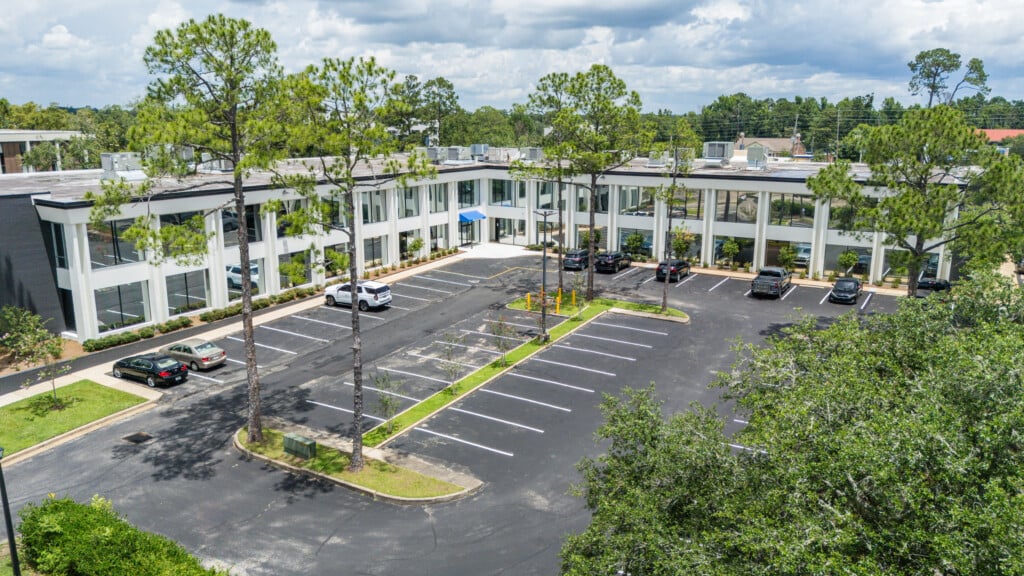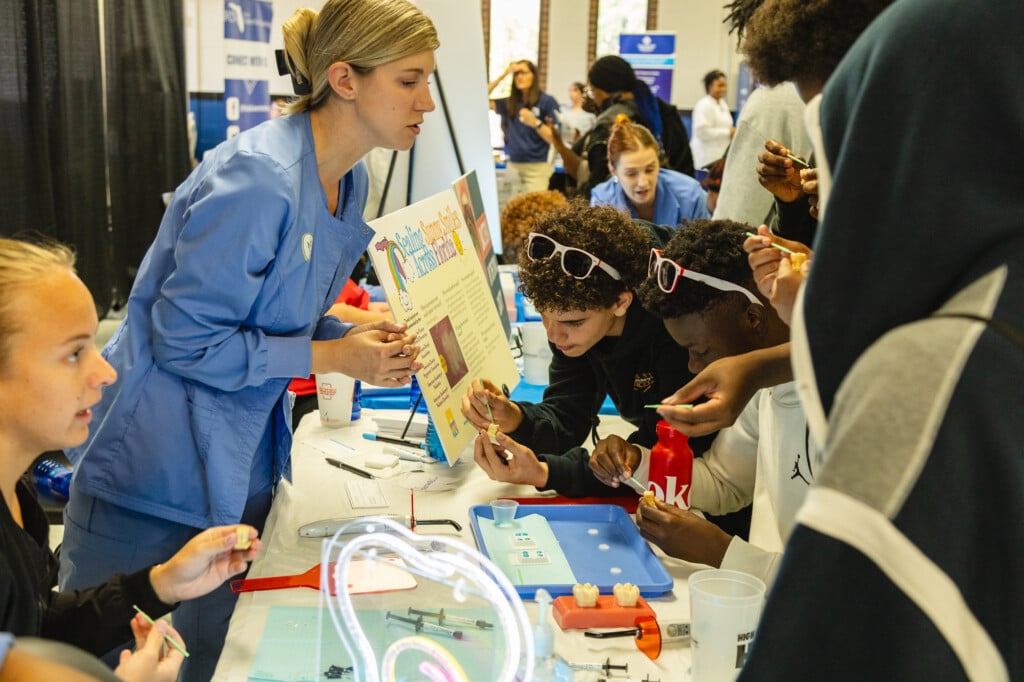Intriguing, Exciting Potential
Pensacola impresses economic development chief

Contemplating a move to Pensacola, Brian Hilson sought to discover how important economic development is to the city’s elected leadership, business community and the city’s residents, generally.
Does it really want to grow? Does it want to understand what its potential for growth might be? Is it prepared to do whatever may be required to responsibly realize that potential?
Hilson satisfied himself that the answer to each of those questions is “Yes.”
“What I learned — and this has been reinforced since I arrived here last August — is that economic development truly is a high priority in Pensacola and Escambia County,” Hilson said. “Virtually anyone you ask to be involved in some capacity is willing to do so. You can’t say that about every community.”
Hilson described the support of Mayor D.C. Reeves, Pensacola City Council members and Escambia County commissioners as “absolutely fantastic.”
“Everyone has high expectations, as they should, and if they didn’t, I wouldn’t be here,” Hilson said. “To do our best, we have to shoot high, and that’s what we’re doing at the FloridaWest Economic Development Alliance.”
FloridaWest brings together public and private agencies, businesses, organizations and leaders in efforts to sustain and grow economic prosperity in its service area. Hilson is the alliance’s CEO, having succeeded Scott Luth, who is now the vice president for economic development and capital programs at Space Florida.
Hilson moved to Pensacola from Alabama, where he had been involved in economic development work since 1980 in roles including president/CEO at the Chamber of Commerce of Huntsville/Madison County; president/CEO of the Birmingham Business Alliance; and executive director of the Japan-America Society of Alabama.
He helped land whales such as Toyota and three Mercedes facilities ($2.3 billion in investment, 2,700 jobs); the Hudson-Alpha Institute for Biotechnology ($120 million in investment, 1,000 jobs); Raytheon ($75 million in investment, 300 jobs); and Amazon ($180 million in investment, 1,500 jobs).
In 2017, he was named one of the top 50 economic developers in the country by Consultant Connect.

Brian Hilson compares notes with Danita Andrews, the chief business development officer at the FloridaWest Economic Development Alliance. Hilson considers that he was fortunate to inherit a talented and well-connected staff at the alliance. Photo by Mike Fender
“Most communities and states expect economic development to be a recruitment process targeting large businesses capable of transformational projects,” Hilson said. “They are important, of course. They command the headlines, they’re what people love to talk about and I’ve been fortunate to work on some of those.
“But equally important, if not more so, is taking care of existing companies, making sure that from an economic development perspective, we understand what they need and want. When they have opportunities to expand, we want that activity to occur locally.”
Established companies can serve economic development organizations as allies and sources of testimonials.
“Making them the top priority is just the right thing to do,” Hilson emphasized.
In addition to recruiting new employers and facilitating growth among established businesses, Hilson said the third leg of economic development is encouraging entrepreneurship, especially in Pensacola, in the technology sector at the CO:LAB incubator and elsewhere.
“There is no magic in economic development,” Hilson said. “You prepare well, you work hard, you compete and you just keep doing it over and over.”
Improving upon past performance is a worthy goal, Hilson said, but it can be helpful to avoid getting too hung up on your batting average. Never can an economic development organization control all of the factors involved in a relocation or expansion decision.
“I told my team on my first day that we were going to hit the ground running and do the right things and work hard,” Hilson said. “There are some organizations that are pretty good at perpetuating themselves and taking up space, and then there are others that actually move the ball. We’re gonna move the ball.
“My responsibilities lie in marketing, community relations with the board, steering the ship to make sure our activities are consistent with our strategies — it’s a lot of things.”

Brian Hilson departed Alabama to become CEO of the FloridaWest Economic Development Alliance. He views encouraging entrepreneurship as a big part of his job. In Pensacola, businesses often get their start at the alliance’s CO:LAB incubator and business accelerator, above. Photo by Mike Fender
Hilson sees Pensacola’s potential as “intriguing and exciting” and similar to that of technology-rich Huntsville.
“One of the key strengths in Pensacola is the attractiveness of the community to technologists as a place to live and work,” Hilson said. “That, in turn, makes Pensacola attractive to tech-based companies. We have plenty of evidence of that among start-up companies, and we have companies that are looking to move here, both domestic and international.”
Companies with the flexibility and freedom to choose where they are going to set up shop make site decisions driven, for the most part, by where they can attract and retain top talent, Hilson has found.
“They size up a community’s attractiveness based on availability of talent, training and education, cost of the workforce, spousal employment opportunities — all of those things count,” Hilson said.
“Pensacola is a place that many people had only previously visited, and now they are discovering that it’s also a great place to live, work and do business.”
And, said Hilson, it is part of a great region.
“The smart approach for really good economic development organizations is for them to work together,” Hilson said. “At Florida’s Great Northwest, (president/CEO) Jennifer (Conoley) has quickly become a friend. I have never been one to get caught up in who gets the credit.
“We also have to be good neighbors. What happens in Escambia County is important to counties that surround us and vice versa. Our workforce is very fluid. It’s regional. The quality of schools and the nature of the workforce in Santa Rosa County are important to employers in Escambia County.”
How’s business?
“We are good in some areas, light in others — a little light in some of the manufacturing projects that I would like to see us working, but we’re actually very strong with some of the tech companies,” Hilson said. “I have some near-term expectations with tech companies and some manufacturing projects that we’re working on. And longer-term expectations for those and other types of opportunities.”
For Hilson, economic development is essential and foundational.
“The key ingredient for advancing a community’s quality of life is economic prosperity, and that means having jobs that align well with what the local workforce is capable of and seeing, too, that the workforce evolves to meet the needs of businesses in the future.
“A good job that pays well and is a career opportunity is a lifeline to individuals and their families. It’s generational. What I’ve always liked about economic development is the responsibility to make a place better so that everyone benefits.”
Escambia County Community Profile
Source: Data USA
Total Population: 324,878 (U.S. Census estimate, 2022)
Age Distribution
0–9: 36,603
10–19: 40,359
20–29: 50,118
30–39: 40,986
40–49: 37,237
50–59: 39,253
60–69: 42,326
70+: 37,996
Educational Attainment
Grade 6: 1.82%
Grade 9–12: 2.16%
High School: 20.4%
Some College: 17.26%
Associate Degree: 8.28%
Bachelor’s Degree: 15.4%
Graduate Degree: 7.01%
Labor Force: Top Jobs by Occupation
Office/Admin Support: 13.7%
Sales: 11.6%
Management: 9.35%
Food Prep/Serving: 7.15%
Education/Library: 5.57%
Labor Force: Top Industries by Jobs
Health Care: 20,376
Retail: 19,064
Hospitality/Food: 13,385
Education: 12,639


